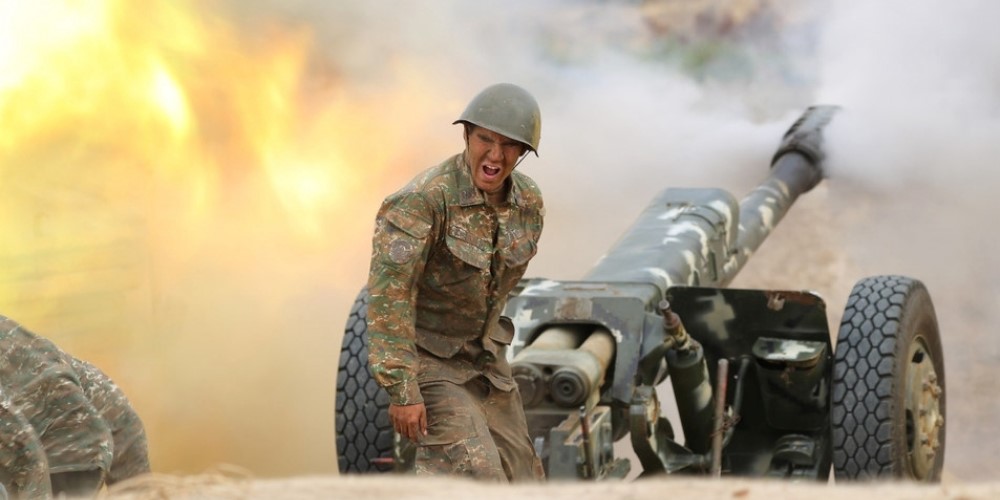The American abandonment of Armenians a century ago suggests disquieting lessons for Christians and other Middle East minorities today.
A Crisis in the Caucasus
For a month in the South Caucasus, Turkey and Azerbaijan have been waging war on Armenia. The war concerns Karabakh, a disputed region with a Christian Armenian population inside Muslim Azerbaijan. The war already has killed thousands. In violation of international law, Azerbaijan repeatedly has dropped cluster bombs on Karabakh’s main city, specifically targeting churches and cultural sites. Civilians huddle together in basement shelters where Covid easily spreads. As the noose around the region tightens, 90,000 people have fled their homes and a refugee crisis in the dead of winter seems a possibility. In a world accustomed to horror, the situation in Karabakh retains its capacity to shock.
Americans, who have our own problems, might be inclined to ignore the situation. And Azerbaijan, flush with petrodollars, spends millions on lobbying that creates misperceptions about the conflict. But Americans should pay attention. The Karabakh war is a civilizational clash between democracy and dictatorship. It also reflects Turkey’s growing ambitions in the Caucasus and the Near East generally, which could spark a much wider conflict. America can do something to help end the unfolding catastrophe before it gets even worse—without committing to another foreign adventure. Indeed, America can help by ending its own inadvertent involvement in the conflict, which consists of military support for the aggressors.
The Conflict Over Karabakh
Karabakh has had an Armenian Christian identity since the country’s conversion in the fourth century. Some of the Armenian Church’s oldest monasteries still function there today. Karabakh has had many rulers down the centuries—Mongols, Persians, and Russians, to name a few—but it has always maintained an Armenian Christian majority, including 100 years ago, during World War I, when the Ottoman and Czarist Empires fought each other for control of the Caucasus.
Armenians, who lived in large numbers on both sides of the border, found themselves in the middle of the conflict. An exaggerated concern that Armenians would fight alongside Christian Russia—some Armenians did join the Russians, but others fought for the Ottomans—led Turkey to undertake an ethnic cleansing campaign known as the Armenian Genocide. The Genocide eliminated the once-sizable Christian population of Anatolia—not only Armenians, but Greek and Syriac Christians as well.
When the Turks invaded the Caucasus toward the end of the war, Azeris treated them as liberators. Azeris are a Turkic people (though they are Shia, not Sunni, Muslims) and they fought against Armenians, including in Karabakh, where horrible massacres occurred. The Turkish invasion failed, however, and, following the war, the new Soviet government divided the Caucasus among the resident ethnic groups. At the time, Karabakh was more than 90 percent Armenian, and the Soviets initially promised it to the new Armenian SSR. But Stalin, who was then commissar of nationalities, reversed this decision and placed the region in Azerbaijan as part of a divide-and-conquer strategy.
When the Soviet Union collapsed 30 years ago and Armenia and Azerbaijan became independent states, Karabakh Armenians requested union with Armenia. Azerbaijan responded with anti-Armenian pogroms throughout the country, including in the Azeri capital, Baku, where, with government support, mobs murdered Armenians and looted and burned Armenian properties. A three-year war followed in which 30,000 people died and hundreds of thousands became refugees on both sides. At the close of the war in 1994, Armenians had successfully defended Karabakh, which they proclaimed an independent state, and seized some surrounding territories as a buffer. Negotiations over the ultimate resolution of the conflict have been proceeding off-and-on ever since.
Azerbaijan has been spending its great oil wealth on sophisticated weapons for years and the government’s incessant anti-Armenian propaganda has primed its people, many of whom suffer in poverty, for a reconquest of Karabakh. Azerbaijan paints Armenians as the aggressors, an absurd claim, especially when one considers the geography—Armenians occupy the high ground—and the huge disparity in numbers. Taken together, Azerbaijan and Turkey have a population of around 90 million; Armenia, maybe 3 million. For Armenia to provoke an unnecessary conflict would be extremely foolish.
But the key explanation for the current crisis is Turkey. Turkey has instigated the war as part of a larger geopolitical strategy that involves military action in Syria and Libya, as well as threats against Greece and Israel. Turkish President Erdogan wishes to re-create the Ottoman Empire, a project that includes, in his own words, “fulfilling the mission of our grandfathers in the Caucasus.” This means, presumably, eliminating Armenia and Armenians altogether. As French commentator Alexandre Del Valle told the National Catholic Register, if Turkey could today eliminate Armenians in the Caucasus, as it did 100 years ago in Anatolia, “there would no longer be any Christian people left to represent a civilizational obstacle to the unification of Turkish brothers.” Azeri President Aliyev has stated publicly that Armenia itself rightfully belongs to Azerbaijan.
After weeks of cluster bombing, not to mention the history of pogroms and other crimes, Karabakh Armenians can never be safe under Azeri rule.
Turkey has instigated and abetted Azerbaijan’s campaign in numerous ways. It has transported thousands of Islamist terrorists from Syria to fight in Karabakh. It has sold Azerbaijan large amounts of high-tech weaponry, $100 million worth just this summer, including combat drones. It has supplied F-16 fighters that can cover Azeri troop movements. This assistance has allowed Azerbaijan to make significant battlefield gains, though not as many as it might have hoped after a month of fighting.
Against all this, Armenia fights alone. Many Westerners assume Russia will come to Armenia’s assistance. Russia has a military base in Armenia and a defense treaty as well, but in a speech last week President Putin publicly signaled Russia’s neutrality. While noting that the crisis began 30 years ago with “brutal crimes” against Armenians in Baku, and that Armenians suffered greatly in the last century, he maintained that Russia has partnerships with both countries. (Indeed, Russia has sold weapons to both sides for years). Iran, another country the West assumes tacitly favors Armenia, has publicly stated its support for Azerbaijan. In fact, President Aliyev recently announced that Iran sells Azerbaijan weapons.
American Interests at Stake
America has little interest in taking sides with a country that imports Islamist terrorists to fight for it and purchases weapons from Iran. It likewise has little interest in encouraging Turkish belligerence and opportunism, which ultimately threaten close allies like Greece and Israel. (Israel has supported the Turkish campaign in Karabakh by selling combat drones to Azerbaijan; perhaps it should reconsider that strategy in light of President Erdogan’s claim last month that Jerusalem is “our city”.) And Turkey has signaled that it values its relationship with America lightly. Last week it tested a newly-purchased Russian missile defense system, capable of countering American fighter jets, over strenuous American objections.
America does have an interest in supporting Armenia, a genuine democracy that has tried in recent years to improve ties with the West. In 2018, in a free and fair election, Armenians voted out an unpopular government and elected Prime Minister Pashinyan, who has tried to reform the country while maintaining necessary links with Russia. (Indeed, some analysts say Russia remains passive for the moment precisely to teach Pashinyan a lesson: Armenia needs Russia.) Armenia has a free press and has allowed journalists access to the conflict zone to see what is happening. Azerbaijan, by contrast, is a by-the-book dictatorship whose government has been run by the same family for 30 years. It lacks a free press and excludes journalists from the combat zone, for good reason: journalists could report Azeri war crimes.
But it is not simply a matter of helping a fledgling democracy. First, America, and Western civilization generally, has an interest in stopping the use of imported Islamist terrorists as rapid-deployment shock troops to destabilize conflicts and change facts on the ground. (Last week, the US embassy in Baku warned of possible terrorist attacks on American interests inside the country, no doubt fueled by the presence of these Islamist fighters.) If Azerbaijan’s employment of Syrian mercenaries is successful in Karabakh, other countries will surely take notice and replicate the tactic. Second, settling the long-standing conflict in Karabakh will increase America’s soft power and influence in the Near East generally, much as the recent Abraham Accords have done. Finally, there is a need to curb the increasingly erratic behavior of President Erdogan, who, in addition to purchasing that Russian missile defense system, has insulted important American allies in Europe and baited America itself.
America should consider a range of options to help ease the Karabakh crisis, none of which would involve America as a participant in the conflict. First, it can send humanitarian assistance to the region, indirectly if necessary. Second, it can suspend the direct or third-party sale or transfer of military equipment and technology to Azerbaijan. America provided $100 million of military aid to Azerbaijan just in 2018 and 2019, much more than to any other country in the region, ostensibly to help Azerbaijan defend itself against Iran. With Azerbaijan openly purchasing weapons from Iran, that strategy seems counterproductive. America can also suspend military sales and transfers to Turkey while Turkey continues its belligerent policy in Karabakh and elsewhere. If this doesn’t work, America could impose sanctions on both countries.
Finally, America can continue to push Azerbaijan to cease hostilities, return to negotiations, and reach a diplomatic settlement of Karabakh’s status. (After agreeing to one US-brokered ceasefire last weekend, Azerbaijan immediately broke it.) A comprehensive settlement has been in sight for decades: Armenia returns most captured territories to Azerbaijan and allows refugees to return in exchange for some sort of independence for Karabakh. Michael Rubin argues in The National Interest that America should support this idea, which has a precedent in Kosovo: “remedial secession” to protect an endangered minority. After weeks of cluster bombing, not to mention the history of pogroms and other crimes, Karabakh Armenians can never be safe under Azeri rule.
President Aliyev cynically assures outsiders of his willingness to welcome Armenians as fellow citizens. But when they are for domestic consumption, his words and actions belie such claims of tolerance. One famous example: In 2012 an Azeri participant in a joint NATO exercise in Hungary murdered his Armenian counterpart while he slept; Aliyev obtained the culprit’s extradition and declared him a national hero when he returned home. Aliyev’s longstanding anti-Armenian rhetoric, as well as the destruction he has unleashed now, make clear that were Azerbaijan to regain control of Karabakh, the result would be ethnic cleansing of its Armenian Christian population.
None of these options is perfect—neither Azerbaijan nor Turkey seems inclined to listen to reason at the moment—but there are still good reasons for America to try. One hundred years ago, after the Armenian Genocide, America refused to accept a mandate for Armenia and reluctantly abandoned Armenians to their fate. At the end of World War I, America did not have the stomach for a long-term military commitment in the region. But today it can help Armenia, a genuine democracy in a region where America has important interests. And it can assist without committing to another foreign adventure. By doing so, America would make clear that it will not abandon Armenians a second time.


